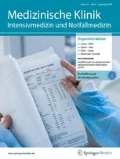Zusammenfassung
Hintergrund
Immer mehr Patienten werden mit direkt wirkenden oralen Antikoagulanzien (DOAK) behandelt. Unter DOAK scheint es insbesondere aus dem unteren Gastroeintestinaltrakt häufiger zu Blutungen zu kommen als unter Vitamin-K-Antagonisten (Phenprocoumon bzw. Warfarin).
Ziel
Eine mögliche Vorgehensweise bei der schweren gastrointestinalen Blutung unter DOAK soll nun gemeinsam von Gastroenterologen und Kardiologen erarbeitet werden.
Material und Methoden
Eine selektive Literaturrecherche wurde geführt. Eigene Erfahrungswerte wurden mit eingearbeitet.
Ergebnis
Die Entscheidung zur Durchführung einer prokoagulatorischen Therapie (30–50 I.E. Prothrombinkonzentrat, PPSB, pro kgKG langsam i.v.) hängt von verschiedenen Faktoren ab und sollte nicht unkritisch erfolgen. Spezifische Antidote stehen vor der Zulassung. Nach der Blutungsepisode müssen potentiell beeinflussbare Auslöser (Arzneimittelinteraktion, Einschränkung der Nierenfunktion) ausgeschlossen werden. Das Rezidivblutungsrisiko und das Risiko für ein thromboembolisches Ereignis müssen abgewogen werden, bevor eine Entscheidung zur Wiederaufnahme einer Antikoagulation und deren Form getroffen wird. Dosisreduktionen und ein Wechsel auf Apixaban (in reduzierter Dosis) sind Optionen zur Risikoreduktion, auch Vitamin-K-Antagonisten können erwogen werden.
Diskussion
Welche Rolle die spezifischen Antidote einnehmen werden, ist noch unklar.
Abstract
Background
More and more patients are being treated with direct oral anticoagulants (DOAC). Under treatment with DOACs gastrointestinal bleeding appears to occur more frequently, particularly in the lower gastrointestinal tract, compared to treatment with vitamin K antagonists (e.g. warfarin).
Objective
A possible approach should now be elaborated in a joint effort by gastroenterologists and cardiologists.
Material and methods
A selective literatue search was carried out and own experiences were also included.
Results
The decision to perform procoagulant therapy by slowly injecting 30–50 IU prothrombin complex concentrate (PPSB) per kg body weight intravenously depends on various factors and should be assessed critically. Specific antidotes are awaiting approval. After a bleeding episode potentially controllable and reversible triggers must be excluded (e.g. drug interactions and renal impairment). The risk of recurrent bleeding and the risk of thromboembolic events have to be weighed against each other before deciding to readminister an anticoagulant and its form. Dose reduction and changing to apixaban (in reduced dosage) are options for risk reduction and vitamin K antagonists can also be considered.
Discussion
It is still unclear what role specific antidotes will play.


Literatur
Ruff CT et al (2014) Comparison of the efficacy and safety of new oral anticoagulants with warfarin in patients with atrial fibrillation: a meta-analysis of randomised trials. Lancet 383(9921):955–962
Gómez-Outes A et al (2013) Dabigatran, Rivaroxaban or Apixaban versus Warfarin in Patients with Nonvalvular Atrial Fibrillation: a systematic review and meta-analysis of subgroups. Thrombosis 2013:640723
Patel MR et al (2011) Rivaroxaban versus warfarin in patients in nonvalvular atrial fibrillation. N Engl J Med 365:883–891
Connolly SJ et al (2009) Dabigatran versus warfarin in patients with atrial fibrillation. N Engl J Med 361:1139–1151
Granger CB et al (2011) Apixaban versus warfarin in patients with atrial fibrillation. N Engl J Med 365:981–992
Holster IL et al (2013) New oral anticoagulants increase risk for gastrointestinal bleeding: a systematic review and meta-analysis. Gastroenterology 145:105–112
Beyer-Westendorf J et al (2014) Rates, management and outcome of rivaroxaban bleeding in daily care: results from the Dresden NOAC registry. Blood 124(6):955–962
Van Es N et al (2014) Direct oral anticoagulants compared with vitamin K antagonists for acute venous thromboembolism: evidence from phase 3 trials. Blood 124(12):1968–1975
Caldeira D et al (2015) Non-vitamin K antagonist oral anticoagulants and major bleeding-realted fatality in patients with atrial fibrillation and venous thrombembolism: a systematic review and meta-analysis. Heart 101(15):1204–1211. doi:10.1136/heartjnl-2015-307489
Koch A, Buendgens L et al (2013) Ursachen, patientenspezifische Risikofaktoren und prognostische Indikatoren bei akuter gastrointestinaler Blutung und intensivmedizinischer Therapieindikation. Eine retrospektive Untersuchung der Jahre 1999–2010. Med Klin Intensivmed Notfmed 108:214–222
Braun G, Messmann H (2013) Gastrointestinale Blutungen beim kardiologischen Patienten. Med Klin Intensivmed Notfmed 108:628–633
Pradaxa® Fachinformation. http://www.boehringer-ingelheim.de/content/dam/internet/opu/de_DE/document/pdf/Produkte/Statement_Pradaxa_DE.pdf. Zugegriffen: 11. September 2015
Pernod G et al (2013) Management of major bleeding complications and emergency surgery in patients on long-term treatment with direct oral anticoagulants, thrombin or factor-Xa inhibitors: proposals of the working group on perioperative haemostasis (GIHP) – March 2013. Arch Cardiovasc Dis 106:382–393
Enriquez A et al (2015) Anticoagulation reversal in the era of the non-vitamin K oral anticoagulants. Europace. doi:10.1093/europace/euv030
Eerenberg ES et al (2011) Reversal of rivaroxaban and dabigatran by prothrombin complex concentrate: a randomized placebo controlled cross over study in healthy subjects. Circulation 124:1573–1579
Warketin TE et al (2012) Recombinant factor VIIa and hemodialysis to manage massive dabigatran-associated post cardiac surgery bleeding. Blood 119:2172–2174
Stangier J et al (2010) Influence of renal impairment on the pharmacokinetics and pharmacodynamics of oral dabigatran etexilate: an open label, parallel-group, single- centre study. Clin Pharmacokinet 49:259–268
Xarelto® Fachinformation. http://www.bayerhealthcare.at/html/pdf/gi/Xarelto-15-20mg.pdf. Zugegriffen: 11. September 2015
Eliquis® Fachinformation. https://www.pfizer.de/fileadmin/produktdatenbank/pdf/Eliquis_5mg_FI_01.pdf. Zugegriffen: 11. September 2015
Rockall TA et al (1996) Risk assessment after acute upper gastrointestinal haemorrhage. GUT 38:316–321
Spannagl M, Bauersachs R, Debus ES et al (2012) Therapie mit Dabigatran. Periinterventionelles Management und Interpretation von Gerinnungstests. Hämostaseologie 32:294–305
Koscielny J, Beyer-Westendorf J, Heymann C von (2012) Blutungsrisiko und Blutungsnotfälle unter Rivaroxaban – periinterventionelles Hämostasemanagement. Hämostaseologie 32:287–293
Author information
Authors and Affiliations
Corresponding author
Ethics declarations
Interessenkonflikt
G. Braun hat Vortragshonorare der Firma Bristol Myer Squibb erhalten. H. Messmann, M. Buerke und J. Labenz geben an, dass kein Interessenkonflikt besteht.
Dieser Beitrag beinhaltet keine Studien an Menschen oder Tieren.
Additional information
Redaktion
M. Buerke, Siegen
H. Messmann, Augsburg
Rights and permissions
About this article
Cite this article
Braun, G., Messmann, H., Labenz, J. et al. Direkt wirkende orale Antikoagulanzien bei gastrointestinaler Blutung. Med Klin Intensivmed Notfmed 110, 510–514 (2015). https://doi.org/10.1007/s00063-015-0082-3
Received:
Revised:
Accepted:
Published:
Issue Date:
DOI: https://doi.org/10.1007/s00063-015-0082-3

